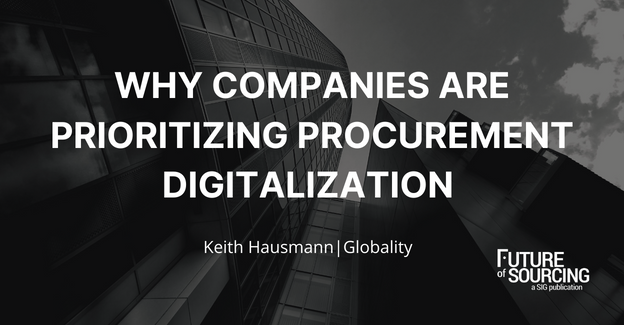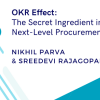It is clear that the economic impact of the global pandemic, significant inflation, and the war in Ukraine is accelerating procurement’s transformation from a transactional function to a key enabler of cost management and business growth. In 2020 and 2021, change was thrust upon us all. In 2022 and beyond, companies have the opportunity to own that transformation.
Globality recently collaborated with ProcureTech to gather insights on the Digital Future of Procurement from more than 170 procurement leaders worldwide across all industry sectors and company sizes. The findings highlight that digital transformation will be a top priority for the next three years as organizations adopt innovative, cutting-edge solutions that will enable them to pivot quickly and react to rising costs from both inflation and further supply chain disruption, as well as other unexpected geopolitical events.
As the digital futurist and Kearny partner, Dr. Elouise Epstein, writes in our survey report, “This digital-first approach allows us to redefine every piece about how we do procurement. We simplify overly convoluted and manual processes (often resulting from poorly performing technology). We are employing the most sophisticated user experience technology to improve how our stakeholders, colleagues, and suppliers interact with us. And, the talent profile and competencies required are vastly changing.”
New Operating Model
Procurement has a unique opportunity to lead company performance during these unpredictable times. Utilizing innovative digital technology means enterprises no longer have to rely on suppliers in a single location or country, minimizing operational and geopolitical risks while generating immediate cost improvement, particularly on under-tapped indirect spend.
This new operating model will be characterized by digital processes that reduce costs, inject agility and resilience, increase business value, and enable companies to do more with less as they actively seek ways to gain efficiencies and improve their bottom line. Our survey found that:
- 90% of companies expect to transform their procurement operating model over the next three years to build more agility and resilience.
- 87% prioritize building digital and data teams to gain predictive insights, deploy new technologies, and react quickly to future disruption.
- 50% of organizations aim to move to a business-centric model, with procurement acting as strategic advisors and business partners rather than executing routine processes.
This reimagined model will also feature increased business self-service, enabling the democratization of procurement and the creation of flatter teams, all of which are typical of the optimal modern corporate structure. This will increase the function’s decision-making speed and execution, allowing procurement to shift its focus to high-priority strategic initiatives and tasks.
High-Performing Teams
Critical to this transformation is the development of a new type of procurement team with different skillsets to that of the traditional category manager. Problem-solving and relationship management, data skills, and the ability to incubate ideas and work with suppliers to drive innovation are the traits that will enable procurement to create value instead of simply remaining a part of the business that negotiates contracts or runs RFPs.
Leading organizations that recognize this are:
- Transforming their operating model and accepting that Future of Procurement will be one of permanent evolution.
- Building dedicated digital teams to gain actionable insights and predictive data from new technology and platforms.
- Optimizing cash flow by using new digital technology to immediately cut costs and improve compliance and risk management.
A Manifesto for Change
Procurement enjoys a unique proposition compared to other business functions, being outward-facing and interacting with every part of an organization – and its operating model should be aligned with a company’s overall strategy, organization and culture. The model should start with stakeholder engagement and experience while helping drive new value across the organization.
Analyzing the survey results, ProcureTech and Globality identified the following key steps that every transformative CPO should prioritize to position their companies to gain a competitive advantage:
- Commit to a full digital transformation that enables procurement to expand its ambition and achievements.
- Create a dynamic digital procurement strategy, roadmap and digital ecosystem.
- Identify and unleash more leaders with a digital-first mindset and capability in procurement.
- Adopt digital-first delivery models and agile project teams.
- Embrace digital and data, process automation, integration and decision intelligence to focus continually on ROI.
Forward-thinking procurement leaders understand that by acting on the above immediately, they can play a crucial role in futureproofing and positioning their organizations to react more quickly and effectively to meet future unexpected disruptions.
Click here to read the full survey report.









